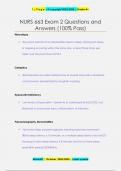1 | P a g e | © copyright 2024/2025 | Grade A+
NURS 663 Exam 2 Questions and
Answers (100% Pass)
Narcolepsy
✓ Recurrent periods of an irrepressible need to sleep, lapsing into sleep,
or napping occurring within the same day, at least three times per
week over the past three months.
Cataplexy
✓ Brief episodes of sudden bilateral loss of muscle tone with maintained
consciousness, precipitated by laughter or joking.
Hypocretin Deficiency
✓ Low levels of Hypocretin-1 (orexin-A) in cerebrospinal fluid (CSF), not
observed in acute brain injury, inflammation, or infection.
Polysomnography Abnormalities
✓ Nocturnal sleep polysomnography showing rapid eye movement
(REM) sleep latency ≤ 15 minutes, or a multiple sleep latency test (MSLT)
showing a mean sleep latency ≤ 8 minutes and two or more sleep-
onset REM periods (SOREMPs).
Master01 | October, 2024/2025 | Latest update
, 1 | P a g e | © copyright 2024/2025 | Grade A+
Narcolepsy without cataplexy but with hypocretin deficiency
✓ Criteria include hypocretin deficiency (B2) but not cataplexy (B1).
Narcolepsy with cataplexy but without hypocretin deficiency
✓ Criteria include cataplexy (B1) but not hypocretin deficiency (B2).
Autosomal dominant cerebellar ataxia, deafness, and narcolepsy
✓ Associated with specific genetic mutations.
Autosomal dominant narcolepsy, obesity, and type 2 diabetes
✓ Associated with specific genetic mutations.
Narcolepsy secondary to another medical condition
✓ For example, due to a structural lesion affecting the hypothalamic
region.
Severity
✓ Can be specified as mild, moderate, or severe based on the
frequency of cataplexy episodes, degree of daytime sleepiness, and
impact on social and occupational functioning.
Master01 | October, 2024/2025 | Latest update
, 1 | P a g e | © copyright 2024/2025 | Grade A+
Mini-Mental State Examination (MMSE)
✓ Widely used test for cognitive function in older adults, covering
arithmetic, memory, and orientation.
Montreal Cognitive Assessment (MoCA)
✓ Comprehensive screening tool evaluating attention, memory,
language, and executive functions.
Clock Drawing Test
✓ Quick test for cognitive impairment, especially executive function and
visuospatial abilities.
Neuropsychological Testing
✓ Battery of tests measuring various cognitive functions to provide a
detailed profile of strengths and weaknesses.
Alzheimer's Disease
✓ Gradual memory loss, confusion, language difficulty, mood changes;
pathology includes amyloid plaques and neurofibrillary tangles.
Delirium
Master01 | October, 2024/2025 | Latest update
, 1 | P a g e | © copyright 2024/2025 | Grade A+
✓ Acute onset, fluctuating consciousness, inattention, and disorganized
thinking; often secondary to medical conditions.
Frontotemporal Degeneration
✓ Personality/behavior changes, language difficulties, executive
dysfunction; atrophy in frontal and temporal lobes.
Lewy Body Disease
✓ Cognitive impairment, visual hallucinations, parkinsonism, fluctuations
in alertness; pathology involves Lewy bodies.
Prion Disease (Creutzfeldt-Jakob Disease)
✓ Rapidly progressive dementia, myoclonus, ataxia; caused by
misfolded prion proteins.
Vascular Disease
✓ Stepwise decline in cognitive function, stroke history, focal
neurological signs; pathology includes infarcts and white matter
changes.
Risks of Prescribing Antipsychotics for People with Dementia
Master01 | October, 2024/2025 | Latest update




